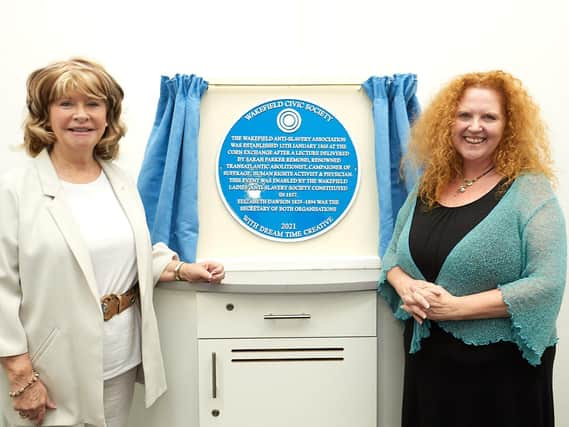Anti-slavery campaigners Blue Plaque recognition in Wakefield


Elizabeth Dawson and Sarah Parker Remond who campaigned to end slavery in the 19th century have been officially recognised for their deeds and actions that changed the course of Wakefield’s political history.
The blue plaque was unveiled last Sunday at Unity Works, by Coun Denise Jeffery, leader of Wakefield Council.
Advertisement
Hide AdAdvertisement
Hide AdCoun Jeffery, said: “The blue plaque is a way to ensure Elizabeth and Sarah’s stories are recognised and it means their places in the history of our district will be much more widely known from now on and in the years to come.”
The event was part of a weekend of activities to promote an interest in the Wakefield Upper Westgate High Street Heritage Action Zone, a project jointly funded by the council and Historic England.
Elizabeth Dawson and Sarah Parker Remond are two of three women whose achievements are being highlighted - the other being Ann Hurst who was awarded her blue plaque as part of a series of International Women’s Day events in 2021.
The Am I Not A Woman And A Sister project, is part of the Visionary Westgate Women and Forgotten Women of Wakefield campaign.
Advertisement
Hide AdAdvertisement
Hide AdIt is spearheaded by Dream Time Creative, and sets out to achieve blue plaque parity in Wakefield by 2028.
The team behind the campaign research notable local women and award blue plaques inscribed with their names which are then placed on buildings to which they have a connection.
Elizabeth Dawson was the secretary of Wakefield’s first ladies’ anti-slavery society in 1857.
The society was responsible for educating the public, inviting prominent speakers and galvanising action and raising funds and awareness of the horrors of slavery.
Advertisement
Hide AdAdvertisement
Hide AdShe went onto become a prominent member and secretary of the 1860 Wakefield Anti-Slavery Association, one of the first mixed gender anti-slavery associations in Great Britain.
Sarah Parker Remond was an African American slavery abolitionist, lecturer and physician.
Her anti-slavery campaign, which she began at just 16-years-old, took her across America and on to Britain and Europe where she tirelessly condemned the atrocities happening in her country.
She was invited to speak in Wakefield on her 1859-1860 lecture tour of England and Ireland on the evils of slavery.
Advertisement
Hide AdAdvertisement
Hide AdThe people of Wakefield were so impressed, they decided to set up an Anti-Slavery Association and Elizabeth Dawson became the secretary.
Sarah Cobham, director of Dream Time Creative, said: “Working with different partners across this project has opened so many opportunities to learn about our fascinating streets and the women who lived here which, in turn continues to offer further, tantalising glimpses into even more Visionary Women within the Westgate area.
“Having Elizabeth Dawson and Sarah Parker Remond honoured by a blue plaque brings us one step closer to blue plaque parity, which is central to the historic and cultural vision of Dream Time Creative.”